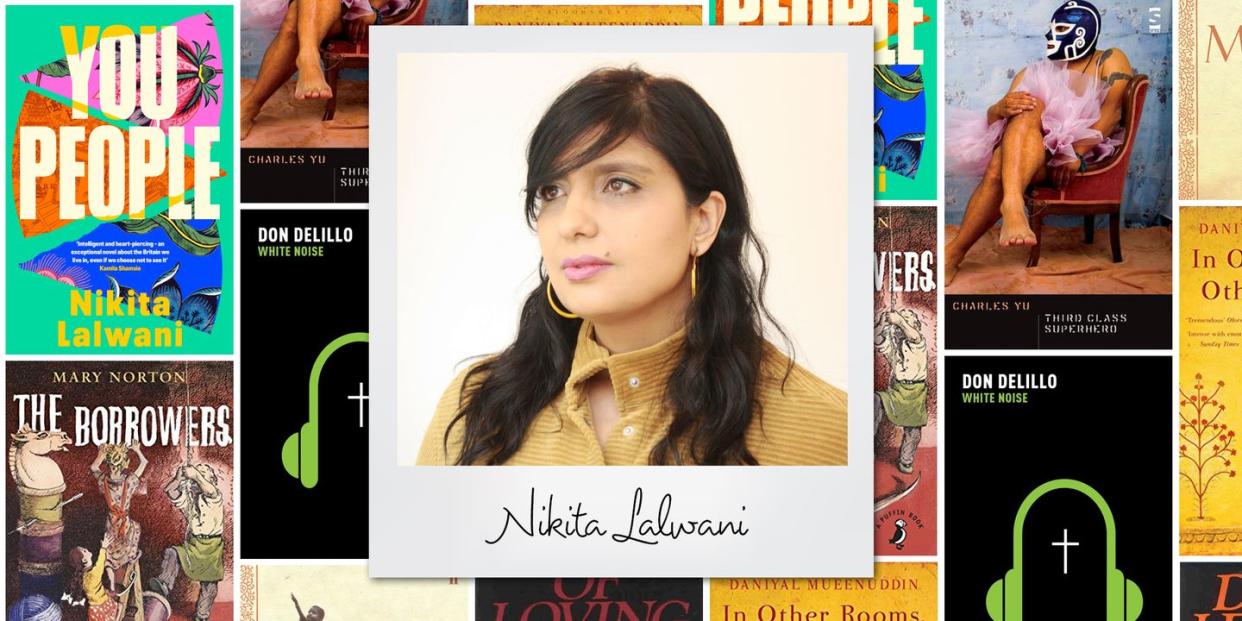The books that shaped me: Nikita Lalwani

Welcome to 'The books that shaped me' - a Good Housekeeping series in which authors talk us through the reads that stand out for them. This week, we're hearing from Nikita Lalwani, a novellist whose first book novel Gifted was longlisted for the Man Booker Prize, shortlisted for the Costa First Novel Award and won the Desmond Elliott Prize. She was also nominated for the Sunday Times Young Writer of the Year Award.
How have books impacted your life?
The local library in Cardiff was very important to me as a child. Being able to wander up and down those aisles, free from scrutiny or pocket money requirements, trying different kinds of books out without constraints or expectations probably had a big impact on me when I was growing up. You can pick up a book off a library shelf and give it a leisurely go with an open mind, there is no need to keep going unless the desire comes upon you - it was brilliant for that.
The childhood book that's stayed with you...
The Borrowers by Mary Norton is a book that I have just handed to my daughter Ishika this week. Looking inside the cover, I saw that I had written a message in the sleeve for my younger brother Nish and ceremoniously handed it to him too, in the nineties, when he was nine-years-old. I must have rescued this copy from parental shelves at some point. It was very important to me, the whole series - something about the way in which Arrietty found her independence in such a practical way, the sheer joy of nimble discovery: the infinite possibilities presented by the bits and bobs thrown away by the thudding 'human beans' above the floorboards. There's a larger parallel too, between children living in the spaces of adult decision-making, reliant on and struggling to break free from adults who are careless with them, or careless in general. It is such a rich series for a child to enter, I think, and only later in adult life did I think about the other, more sinister resonance of a post-war novel - the scene in which those hiding under the floorboards are subjected to 'gassing' by The Rat Catcher, and the attempts of the Boy to locate them when they go missing, has never left me. Although he never sees them again, when the gifts he leaves for them start disappearing, the relief for the reader is profound. The Borrowers is about belief, uncertainty, magical thinking in extremis, the mythology of family history, all of it cascading into the imagination in Norton's propulsive, forthright way.
Your favourite book of all time...
White Noise by Don DeLillo would be a contender for a favourite book, mainly because of the mischief and bravado, the way in which it shouts about the absurdity and tragedy of adult life, and of living under the pressure of mortality, but with such evident joy in the storytelling itself. It's a family drama but exudes a kind of glamour, written as it is with that thrilling, repeating DeLillo melody - slightly trippy, slightly real, always funny but ultimately deeply felt, in spite of the fandango. “Out of some persistent sense of large-scale ruin, we kept inventing hope ” is one of the lines from the book, just one of the many optimistic, erratic soundbites in this classic novel.
The book you wish you'd written...
Reading and writing fiction both require empathy on some level - you can't really sustain a reading or writing life with endless meditations on your own self. A Fine Balance by Rohinton Mistry is a perfect illustration of how telling details, etched painstakingly on a huge canvas, can make the reader feel for a whole cast of characters from different social backgrounds or cultural patterns, without condescension or voyeurism. It is a portrait of India that has been called Dickensian, but for me, it is defined by its lack of caricature, its writerly courage and conviction when it comes to walking in the shoes of others, and its sincerity, the poetic way in which he charts human aspiration. I am slightly awestruck by Mistry's ability to conduct the orchestra in this book, with such an epic outcome, and am about to reread it after several years, in the hope that it will seep into my bloodstream as I start my next book.
The book you wish everyone would read...
In Other Rooms, Other Wonders by Daniyal Mueenuddin is a book that I would recommend in a heartbeat. This evocative set of linked short stories, each told from the point of view of a different inhabitant on a Pakistani farm, is imbued with a real accuracy and precision when it comes to drawing character, and is a reminder that perspective is down to the person who is telling the story. I admire the authorial intention - there is something Chekhovian about the elegant way in which Mueenuddin gives us the mosaic of class, gender and privilege within the spatial boundaries of the compound - but also the way in which the experience of being on the farm is rendered - the landscape is full of sensuality and knowing, what Eudora Welty called “the crossroads of circumstance, the proving ground of What happened? Who's here?, Who's coming?”
The book that's got you through a hard time...
My first serious attempt at the early chapters of my first novel led to writing that can only be described as unremarkable. I was so intimidated by the process of setting words to paper after thinking about it for years, that it led to a kind of stultifying anodyne prose that horrified me as it came out. I was doing an MA in Creative Writing at Bath Spa with an inspirational writer - Gerard Woodward - as my tutor. We had a conversation, early on, about Doris Lessing and I went away and read The Habit of Loving, one of her short story collections, in which the idea of love is cut open in seventeen different ways. It brought me solace in many ways, and indeed, Lessing has since had that power for me, mainly with her short stories. At that time, I pored over the lines, studied them in a very workmanlike way - the stories appear so approachable, and yet they contain something that feels important, magnificent at times - a palpable comfort emerged for me at that point in my life in both the content and the style, I could see that there was something fierce and unique in the stories and that the act of writing them was not just to tame, but to highlight that which is volatile, messy even. I went back to my own lukewarm writing and allowed myself to unleash something, tried to hold away the idea of embarrassment. Very quickly, my work was transformed, for the better. There has always been something soothing for me in reading Lessing, it is something to do with how she cracks open the hypocrisy and ugliness of situations, and allows you in, to witness, it feels very inclusive.
The book that uplifts you...
I think the book Third Class Superhero by Charles Yu is pretty uplifting, even though, at times it contains apocalypse as a natural part of the journey. It's an audacious set of high concept stories, in which love and marriage are presented as dizzying algebraic stunts, and the author imagines a future in which a mother and son act out versions of themselves on set, in pursuit of authentic feeling. The ambition in this collection is wonderful and sometimes the premise for a story is so ridiculous and provocative that you can't help but laugh, and then applaud as Yu brings it to a satisfying conclusion.
You People by Nikita Lalwani, published by Viking, is out now.

Like this article? Sign up to our newsletter to get more articles like this delivered straight to your inbox.
SIGN UP
In need of some positivity or not able to make it to the shops? Enjoy Good Housekeeping delivered directly to your door every month! Subscribe to Good Housekeeping magazine now.
You Might Also Like


